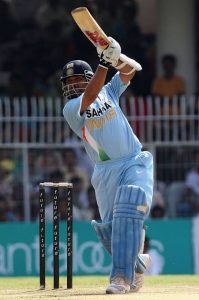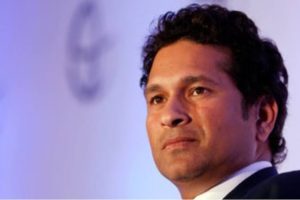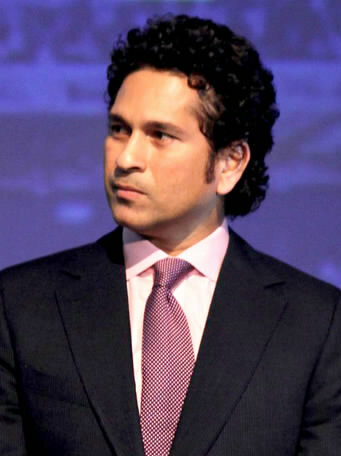Sachin Tendulkar is a former Indian cricketer who led the national team. Regarded as one of cricket’s greatest batsmen, he holds the record for the highest run-scorer in both ODI and Test cricket, with over 18,000 and 15,000 runs, respectively. Additionally, he has received the most player of the match awards in international cricket. Tendulkar served as a Member of Parliament, Rajya Sabha, through nomination from 2012 to 2018.
Early life and Education
Tendulkar was born in Dadar, Bombay, on April 24, 1973, to a Maharashtrian family. His father, Ramesh Tendulkar, was a Marathi novelist, while his mother, Rajni, worked in insurance. He was named after his father’s favorite music director, Sachin Dev Burman. Tendulkar has three older siblings: two half-brothers, Nitin and Ajit, and a half-sister, Savita. His interest in cricket began when his elder brother Ajit introduced him to coach Ramakant Achrekar in 1984. Despite initially struggling, Tendulkar’s talent was recognized, leading him to shift his schooling to Sharadashram Vidyamandir School, where he debuted as a cricketer in 1984. Under Achrekar’s guidance, he honed his skills, earning prized possessions like coins for his achievements. Tendulkar played club cricket for John Bright Cricket Club and Cricket Club of India, showcasing his prowess from a young age. Despite briefly training as a fast bowler, Tendulkar focused on batting, following advice from Australian bowler Dennis Lillee and former Indian batsman Sunil Gavaskar. His remarkable performances, including a record-breaking partnership with Vinod Kambli in 1988, marked him as a cricket prodigy.
Career
Raj Singh Dungarpur is acknowledged for selecting Tendulkar for the Indian tour of Pakistan in late 1989, despite Tendulkar having only one first-class season under his belt. Initially, the Indian selection committee considered him for the West Indies tour earlier that year but opted against it to shield him from the formidable West Indian fast bowlers. Tendulkar made his Test debut against Pakistan in Karachi in November 1989, becoming the youngest player to debut for India in both Tests and ODIs at the ages of 16 years and 205 days and 16 years and 238 days, respectively. Despite facing a barrage of blows from the Pakistani pace attack, he showcased resilience, even continuing to bat after being hit on the nose by a bouncer. His remarkable innings in a 20-over exhibition game in Peshawar earned accolades from Indian captain Krishnamachari Srikkanth. Throughout the series, Tendulkar displayed promise, scoring 215 runs at an average of 35.83 in Tests. He continued to impress during the tour of New Zealand, where he scored a century in Auckland against New Zealand in 1994 and his first ODI century against Australia in Sri Lanka in 1994.
Tendulkar’s reputation continued to soar during the 1991–92 tour of Australia preceding the 1992 Cricket World Cup. Notably, he achieved an unbeaten 148 in the third Test at Sydney, becoming the youngest batsman to score a century in Australia. He further solidified his prowess by scoring 114 in the final Test at Perth, facing a formidable pace attack from Merv Hughes, Bruce Reid, and Craig McDermott. Hughes even remarked to Allan Border at the time, expressing his prediction that Tendulkar would surpass Border’s own runs tally.
During the period of 1994–96, Tendulkar’s performance in ODI matches was particularly noteworthy. He showcased his batting prowess by opening the innings and making an impressive 82 runs off 49 balls against New Zealand in Auckland in 1994. His first ODI century came on September 9, 1994, against Australia in Sri Lanka at Colombo, after competing in 78 ODIs. Despite taking some time to reach this milestone, Tendulkar’s impact on the field was undeniable, marking the beginning of an illustrious career in international cricket.
In the ODI arena, he became a dominant force, showcasing his ability to score runs consistently and adapt to various playing conditions. His innings in Auckland against New Zealand and his first ODI century against Australia in Sri Lanka demonstrated his adaptability and skill.
As his career progressed, Tendulkar’s impact on the game only grew stronger. He became known for his ability to perform under pressure and his unmatched dedication to the sport. These qualities, combined with his exceptional talent, cemented his status as one of the greatest cricketers of all time.
Political Endeavors
In April 2012, President Pratibha Patil nominated Tendulkar to the Rajya Sabha, making him the first active sportsperson and cricketer to receive such an honor. Despite his prestigious appointment, Tendulkar garnered criticism for his poor attendance record at parliamentary sessions and debates. In his six-year term, his attendance was notably low, with only 8 percent overall attendance. Critics highlighted his absence from key sessions, including the budget and winter sessions.
Personal life
On May 24, 1995, Tendulkar married Anjali Mehta, a pediatrician of Gujarati descent whom he had met in 1990. Following their marriage, Anjali chose to leave her medical career. The couple has two children, Sara and Arjun. They reside in a bungalow in the Mumbai suburb of Bandra.
Tendulkar practices Hinduism and holds devotion to Lord Ganesha. He is also a follower of Sathya Sai Baba, whom he visited for the first time in 1997. The passing of Sai Baba on Tendulkar’s 38th birthday in 2011 led him to cancel his birthday celebrations as a mark of respect.
Net Worth
His net worth is estimated to be a staggering $150 million, a testament to his immense success both on and off the field.


